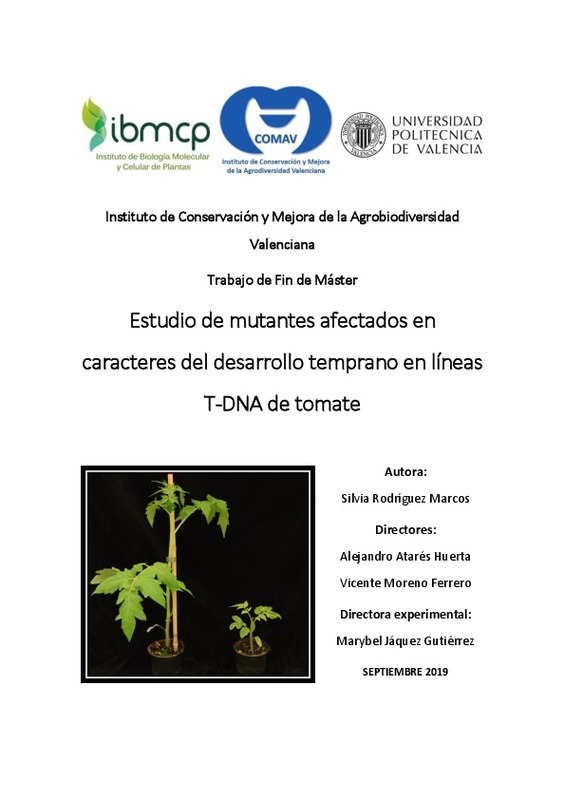|
Resumen:
|
[ES] El conocimiento de aquellos genes que afectan al desarrollo de las plantas y a la interacción con agentes externos es un aspecto clave, tanto a nivel aplicado como desde un punto de vista de la investigación básica. ...[+]
[ES] El conocimiento de aquellos genes que afectan al desarrollo de las plantas y a la interacción con agentes externos es un aspecto clave, tanto a nivel aplicado como desde un punto de vista de la investigación básica. El escrutinio de poblaciones de plantas mutagenizadas permite la identificación de mutantes y, a partir de ellos, los genes responsables de un carácter concreto. La mutagénesis insercional con T-DNA constituye una herramienta muy útil, comparada con otras alternativas metodológicas (mutágenos químicos o físicos), ya que el gen afectado queda etiquetado por el inserto de secuencia conocida, cuya clonación mediante técnicas basadas en la PCR es rápida y sencilla.
El desarrollo de un protocolo eficaz de transformación genética en tomate y especies silvestres relacionadas (Solanum pimpinellifolium, S. pennellii, S. galapagense) ha permitido la obtención de unas 7800 líneas T-DNA en el contexto de distintos proyectos de investigación. Para la identificación de las líneas mutantes se han utilizado técnicas de cultivo in vitro, junto con el cultivo de plantas en el invernadero. A partir de los mutantes identificados se ha clonado una serie de genes relacionados con el desarrollo vegetativo y reproductivo y la tolerancia a distintos estreses abióticos.
En el presente trabajo se han caracterizado líneas T-DNA mutantes, que se habían identificado previamente en nuestro grupo con alteraciones en diferentes aspectos relacionados con el desarrollo temprano del meristemo apical de las plantas de tomate.
[-]
[EN] Knowledge of genes that affect the development of plants and interaction with external
agents is a very important aspect, both from an applied and a basic investigation point
of view. Screening of mutagenized ...[+]
[EN] Knowledge of genes that affect the development of plants and interaction with external
agents is a very important aspect, both from an applied and a basic investigation point
of view. Screening of mutagenized populations allows the identification of plants
mutants and, from them, genes responsible for a character. The insertional mutagenesis
using T-DNA is a very useful tool, compared with other alternatives methods (chemical
o physical mutagens), because the affected gene is tagged by a known DNA insert,
whose cloning using PCR-based techniques is fast and simple.
The development of an efficient genetic transformation protocol in tomato and related
wild species (Solanum pimpinellifolium, S. pennellii, S. galapagense) has allowed
obtaining some 7800 T-DNA lines in the context of several investigation projects. In
order to identify the mutant lines, in vitro culture techniques have been used, together
with the growth of plants in the greenhouse. A series of genes have been cloned related
to vegetative and reproductive development, and the tolerance to different abiotic
stresses from the identified mutants.
In the present work, mutant T-DNA lines have been characterized, which had previously
been identified in our group, with alterations in different aspects related to the early
development of apical meristem of tomato plants.
[-]
|







